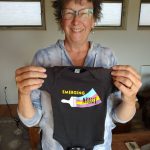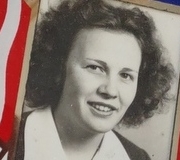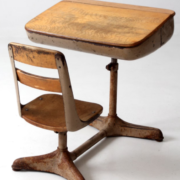The Prodigal Child
As a child, I loved to watch magicians perform. I was convinced that if I just looked at the right place at the very right second, I could see beneath their illusions. I could discover how that coin appeared or how those two seemingly joined rings came apart.
Sometimes, when I read this parable in Luke Chapter 15, I feel the same sense of anxious watchfulness: Should I be watching the son who took his inheritance and want away? Does the angry older brother hold the key to the illusion? Or is it the loving father who should capture my gaze? Where am I in this story? Am I like one the sons, or like the father?
I am not the first reader of this scripture to be unsure of its portent in my life. There have been arguments about its meaning, and about who each of the three main characters represents, even earlier than the time of Jerome, the church leader who, sometime around the year 400, likely coined the phrase “prodigal son” as a title to this parable. The arguments about its meaning are legion, each describing the three main characters in wildly different ways, some noble, some despicable. The books and songs and tributes are uncountable. There’s even a Prodigal Son Brewing Co in Pendleton OR.
The theologian Amy-Jill Levine, who recently taught this parable at a church Sunday school class, said one student suggested that if the younger son had only experienced prayer in the public school system, none of this mess would have happened.
I think Jesus knew we humans would take his parables and twist them to match our own view of the world. In the book of Matthew, Jesus tells the disciples that many who hear the parables will not really see them, or hear them, or understand them because their hearts have become calloused. They’ve become so wrapped up in their own ego-centric view of God, so convinced that God sees things they way they do, that they have missed the simple, magical truth of our story.
And the simple magic is this, to use the title of a popular TV show, “This is Us.” We are, each of us, the young son, the elder son, and the father. We have each been lost, and in God’s grace, we have been found. It is as simple, and as beautifully magical, as that. The young son lost his way, “and coming to himself” the scripture says, returned to his father and his God. Found. The elder son, in his anger, is lost, until his father points out the simple truth of his never-ending love and provision. Found. And the father, too is lost in grief but his own Heavenly father hears the longing in his heart, and his son is returned to him. Found. We know what this feels like, don’t we, the sensation of losing something precious, and finding it again. The joy! The relief!
I want to tell you a story today of losing and finding, from a mother’s perspective. About 18 months ago, my daughter Abbey wrote a long letter to tell us something that created within me a deep sense of loss and anguish. Abbey, who is 36 years old, admitted to us that she had never felt at peace being a woman, and that she had decided, after much of her own years of anguish and pain, to live her life as a man. I was quite comfortable with Abbey as a Lesbian woman, something I had known about her since her early teens. It had never changed how much I loved her or enjoyed being with her, how much I valued her as God’s dear creation, my own precious child. But this … this was more than my heart could bear.
I got in the car and drove to her house in Portland and pleaded with her, crying. She should she a counselor I said … she was. She should understand that this change was permanent … she did. She was patient with me, she cried too, witnessing my pain, and at her own inability to communicate with me what this all meant to her. I was in shock. I left her house, and driving home, I felt lost to her, and she to me. Lost with no way back.
So I did what many of us in this congregation have done when we are hurting and confused. I knocked on Pastor Vicky’s door. I remember us sitting face to face when I told her about Abbey, and her face shared some of the same shock as mine. Neither of us knew, first hand, as mothers, how to handle just such a situation. Yes, we are a welcoming congregation, committed to loving those who have been marginalized and turned away from The Church. But this was my own child, and suddenly, theory became reality. Images of Abbey as a girl in pink, as a child drawing me sweet little pictures, as a cook beside me in the kitchen, now all seemed like images from another life, a life I had lost. Pastor Vicky, in helping me search for a way back to Abbey, said, “I think you need to grieve for the loss of your daughter first before you can embrace your son.”
So I let myself grieve. And all the while, Abbey was changing. She changed her name to Max, my grandfather’s name. Stu and I struggled at home to call her “he”, to correct each other when we slipped up. I still referenced “my daughter” to people I didn’t know well, and then would have to correct myself with, “I mean, my son,” which sounded about as addelpated as one could be, and which I said without conviction. I struggled to accept, and in turn, to love, Max. But I still could not let a son into my life. When I searched the horizon for my child, as that father must have done in Jesus’ parable, it was still Abbey I longed to see, not Max. Perhaps that father felt the same way at first … wanting his son back just the way he had been. Like the elder son in our parable, I was bitter and angry at my loss, wondering why the God I had worshiped all my life had not kept this tragedy from my door.
Slowly, slowly, with God’s infinite grace and mercy, I began to change, too. I came to see that Max had, like the young son in our parable, “come to himself.” He was at peace for the first time in his adult life; confident; happy. And he was going through so much! Physical changes, professional challenges as he informed the administration in the school where he taught of his new name and gender; his partner left him, unable to adjust to Abbey as Max. I began to feel a deep desire to be there for him, to care for him, to nurture him as I had when he needed me as a child.
In June of last year, Max had surgery, and I went to Portland to care for him. There were medications he had to take on schedule in the middle of the night, and I set an alarm, going quietly into his room at one in the morning. I switched on the light, and there was my child, my son. The last time I cared for him in the middle of the night, he was a nursing baby. All that love flooded my heart again, and I realized that my love for Max, for my son, transcended sexual identity, gender, and a hundred other things. My love for him was not dependent on any of that. I simply loved him. That was the simple magic of it. And in that moment, not only did I find my child again, but I was returned to him too.
In that moment, I also got a glimpse of God’s love for me, for its infinite forgiveness, of its disregard for those 100 reasons or more that God should not want me back, should not be happy to see me on the horizon returning home. And yet, my infinite Father, He is. Jesus wanted us to understand both losing and finding, to see ourselves in all three of those figures, both lost and found. The simple, magic truth of God’s never failing search to bring us home and love us.
– Delivered at Riverside Community Church, 2022


 Two passions: food, words. Some days, it’s a tug of war, some days, a peaceful coexistence.
Best day ever? Create it, cook it, eat it, write about it. I sold my restaurant, Nora’s Table, in 2015, and now I can be possessed by anything in the long day that I choose: writing 400 words, creating the next menu for the Chefs Collective at Ruby June Inn, teaching a cooking class at Jacob Williams Winery, or tromping through the fields with farmer Laurel Bouret.
A rainy afternoon with a foundational cookbook, such as Marlene Mater’s fabulous “Allepo Cookbook” or Michael Ruhlman and Brian Polcyn’s “Charcuterie” can feed my spirit and spark my creative power. So can reading Maggie Shipstead, Michael Chabon or Alison Kraus.
I live in Hood River, Oregon, with Stuart, also known as the Happy Meal Man. In other words, all I can desire. And then there’s Satchel, our six-year old Idaho Shag who is simply the world’s best dog. We run together, and sometimes, we even let Stu join us.
Our oldest daughter Annie and grandson Levi live in Eugene, Oregon. Annie is cooking in restaurants, like her Mom. Son Max and his wife Hannah and our granddaughter Shiloh are in Portland, where he is a school principal. It’s a good tribe, all the way around.
Two passions: food, words. Some days, it’s a tug of war, some days, a peaceful coexistence.
Best day ever? Create it, cook it, eat it, write about it. I sold my restaurant, Nora’s Table, in 2015, and now I can be possessed by anything in the long day that I choose: writing 400 words, creating the next menu for the Chefs Collective at Ruby June Inn, teaching a cooking class at Jacob Williams Winery, or tromping through the fields with farmer Laurel Bouret.
A rainy afternoon with a foundational cookbook, such as Marlene Mater’s fabulous “Allepo Cookbook” or Michael Ruhlman and Brian Polcyn’s “Charcuterie” can feed my spirit and spark my creative power. So can reading Maggie Shipstead, Michael Chabon or Alison Kraus.
I live in Hood River, Oregon, with Stuart, also known as the Happy Meal Man. In other words, all I can desire. And then there’s Satchel, our six-year old Idaho Shag who is simply the world’s best dog. We run together, and sometimes, we even let Stu join us.
Our oldest daughter Annie and grandson Levi live in Eugene, Oregon. Annie is cooking in restaurants, like her Mom. Son Max and his wife Hannah and our granddaughter Shiloh are in Portland, where he is a school principal. It’s a good tribe, all the way around.
